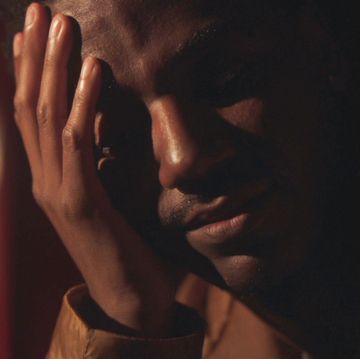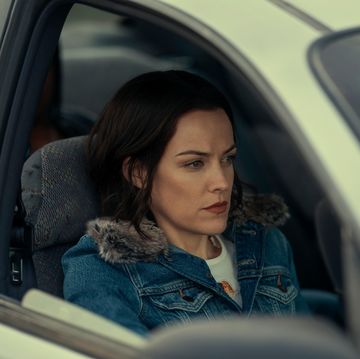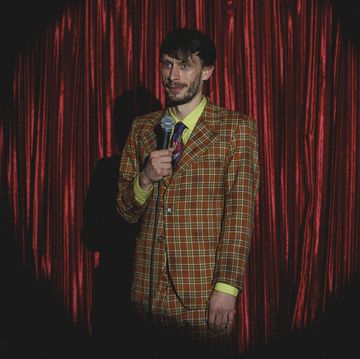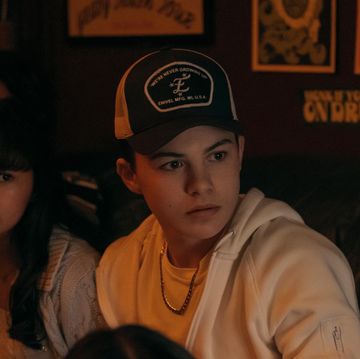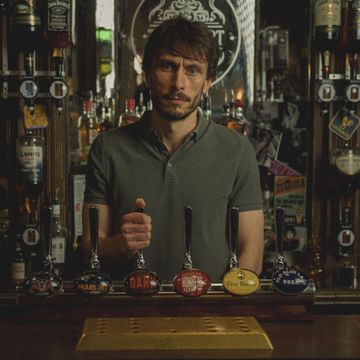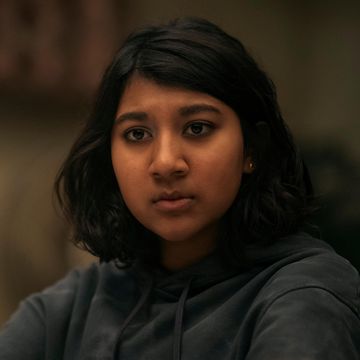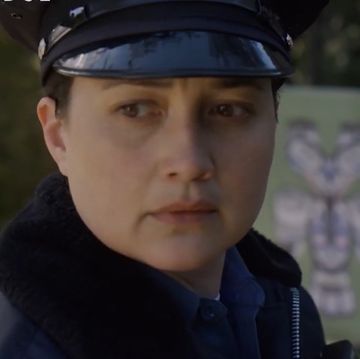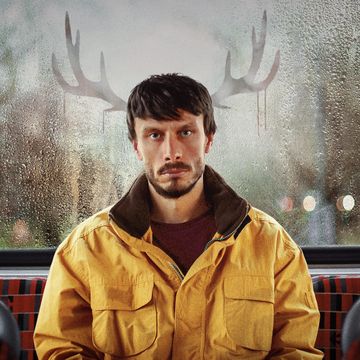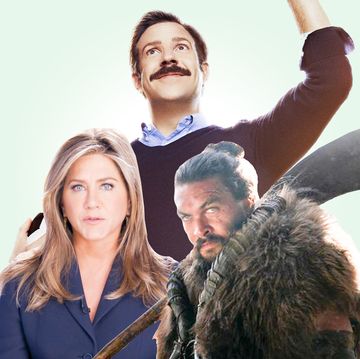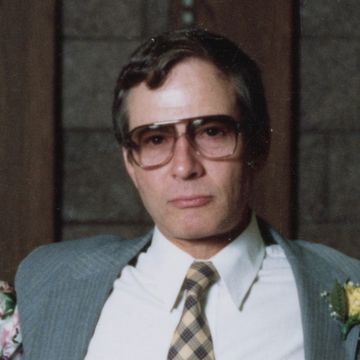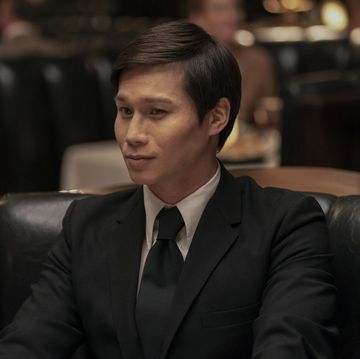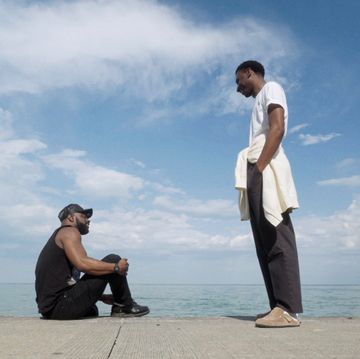It's Terence Winter's last day of shooting Boardwalk Empire, the highly acclaimed — and appropriately awarded — gangster drama that has taken up the bulk of his creative energy for the past seven years, since the screen faded to black on The Sopranos. At the end of the day, the meticulous recreations of Atlantic City's Boardwalk circa 1920, reconstructed in Winter's native Brooklyn, will become a thing of the past. Winter will soon have the final pieces of the HBO series' footage in his hands, ready to be mushed and molded into the eight episodes of its fifth and final season, which premieres Sunday night. But you wouldn't know any of this from talking with Winter, who seems infinitely calm.
Maybe it's because finales are nothing new to the veteran writer and producer, who got his start on the mid-'90s revival of Flipper and came into his own with The Sopranos, on which he wrote and executive produced. Perhaps it's that Winter already knows what's next (another collaboration with Martin Scorsese, Boardwalk Empire'sexecutive producer and Winter's longtime idol). Or maybe it's that Winter knows that if this whole television thing ever gets to be too much for him, he's got a Hollywood screenwriting career to fall back on (as evidenced by his Oscar nomination for Scorsese's Wolf of Wall Street). Whatever the case, Winter is prepared.
ESQUIRE.COM: When and how did you begin toying with the idea of Boardwalk Empire as a series?
TERENCE WINTER: It was 2007 and I was given the book [Boardwalk Empire: The Birth, High Times, and Corruption of Atlantic City by Nelson Johnson] by HBO. We were looking for something to do after The Sopranos, which I was just finishing up. They handed me the book, said they had it under option, and wanted to see if I thought there was a TV series in it. Then, almost as an afterthought, they said, "By the way, Martin Scorsese is attached to it." I said, "Okay. I don't even have to read it. Yes, there's a TV series in it and I'm going to figure it out…" The book itself is essentially a history of Atlantic City from the time it was a mosquito-infested swamp until the present day. When I hit the chapter on the Prohibition years and specifically about this guy, Nucky Johnson, I said, "That's the show!" This guy — this very complicated, corrupt politician who ran the city during Prohibition — was the series and I knew we'd set the world around him. So that was the jumping off point.
ESQ: Did knowing that Scorsese was involved play a part in your thinking about the series as you read the book, and knowing where his strengths and interests lie?
TW: A little bit. We have the same sensibilities in terms of the things we're interested in, but his involvement was certainly in the back of my mind. When I hit the chapter on Prohibition, I realized, "Wow, this is essentially a gangster story." What made it interesting for me is that I had just spent eight years of my career telling a story about the end of organized crime basically on The Sopranos, and this was literally the beginning of organized crime. Prohibition was the single event that made organized crime possible — it made millionaires out of criminals overnight — so it was really the chance to explore the flip side of The Sopranos. These are the events that conspired to create the world I had just spent the last eight years writing about… And the ability to do it as a long-running series, where you get to spend dozens of hours with these characters who were really in their infancy, was just irresistible. You get to meet young Al Capone before he became Al Capone. You get to meet a young Lucky Luciano and these guys still trying to figure out who they were.
ESQ: Had you met him prior to beginning work on Boardwalk Empire?
TW: No, that was the first time. HBO told me, "You're going to go to Martin Scorsese's house and meet him to talk about the show" and I was like a girl going to the prom. What should I wear? [laughs] Literally, I got to his house 20 minutes early and walked around the block. I didn't want to be too early, I didn't want to be too late, I didn't want to appear too eager. This was one of my idols. It's really kind of goofy, but it is absolutely true.
ESQ: And is he pretty hands-on as a producer?
"[Scorsese] remembers shots from movies he hasn't seen in 30 years."
TW: Oh yeah. His name is on this thing and he takes that very seriously. It's not just some vanity thing that he signed on for and forgot. He's very, very active. He watches cuts of the episodes and weighs in on casting decisions. He's extremely hands-on in terms of music choices and things like that. He's got this incredible ability to keep everything straight in his mind like no one I've ever met. I sent him a cut of an episode during season three that he watched and two months later I sent him another cut but I had changed the scene order. It was very subtle, I just changed the order in which the scenes played out, and within five minutes he was like, "Why did you flip those scenes?" He remembers shots from movies he hasn't seen in 30 years. He'll mention some obscure movie and say, "There's a camera movement in this; I want you to go get it and watch this," and he'll describe the shot. And, sure enough, you'll go watch it and it's exactly the way he described it… I always come away from a conversation with Marty with homework. Not that it's assigned, but he'll mention four movies or four books that I'll jot down that I've got to check out. Just offhandedly. There's always another movie I haven't seen or another book or piece of art or something. It's always fascinating.
ESQ: So when did you get the official green light on Boardwalk Empire?
TW: I had a meeting with Marty. His original involvement was supposed to have been as an executive producer only; we were going to get somebody else to direct it. When I handed him the pilot, he called me up and said, "I just read the pilot. I think it's terrific. I think I'd like to direct it." I almost fell out of my chair. He asked, "How do we move this forward?" I said, "Well if you pick up the phone and call the president of HBO and tell him what you just told me, I'm pretty sure we're going to be moving forward pretty quickly." Five minutes later, I got a text message from [HBO CEO and chairman] Richard Plepler and it was just all exclamation points. There were no words, just exclamation points.
ESQ: One of the things that makes the show so interesting is the complexity of its characters, who are both good and bad. Nucky is obviously an example of that, but someone like Richard Harrow, too. As a writer, what's the trick to balancing the often-conflicting parts of a character and still making people like the character and root for the character at the end of the day?
TW: I think if you show any human being in all of their colors, you're going to find moments of, if not relatability, at least empathy or understanding. No one person is any one thing; they're not all good or all bad. So even with a guy like Al Capone, you're going to see moments of humanity there. You're going to see him with his kid or with his brother dying. And even as horrible of a person as he was, you're going to feel something for him. It was certainly true with Tony Soprano. It's just incredible how you start to shed tears for people who you otherwise wouldn't have given two thoughts about.
ESQ: Are there specific characters that you like writing for most?
TW: I liked them all. Richard Harrow was an interesting character to write because he was so unlike anybody else on the show. He had such a different experience. He obviously was coming at the world from such a different place; he is this incredibly wounded man, both physically and psychologically. And having gone through those experiences made him very unique.
ESQ: I'm still very mad at you about Richard, by the way.
TW: [laughs] I know, I know. A lot of people are. He did finally get home in some way.
ESQ: Between The Sopranos and Boardwalk Empire, you've had a lot of practice with this, but is it difficult to kill off a character?
TW: Yeah, it's really hard. One of the things we promised each other early on is that we would not keep a character alive because we liked the actor portraying him. Otherwise we would hardly kill anybody because we kind of like them all. So we had to just completely divorce ourselves from the idea of, "Okay, this is Michael Pitt" or "This is Jack Huston." It's just a character and what is best for the story. It's hard though; you start to get enamored of the characters and writing for them. Michael Pitt was a great example. I knew keeping him alive would have been easier for us, certainly for the story, and we had many opportunities to continue that storyline. Yet I knew the right thing for the series was for Michael's character to die at the end of season two. It was a pivotal moment for Nucky and I wouldn't have believed the show anymore. I wouldn't have believed Nucky was a gangster had he not killed him. If he let him off the hook, I would have said, "Bullshit, this is a television show" instead of, "Wow, this feels real because that's what a gangster would do."
ESQ: What made now seem like the right time to end the series?
TW: Somewhere around two-thirds of the way through season four, we started to feel like we were inadvertently starting to move Nucky toward a conclusion. It wasn't intentional, but it just sort of felt like we were wrapping him up. There wasn't a lot more to explore with Nucky's story. The one thing I didn't want to do was to keep the series on the air longer than it naturally felt like it should be. I feel like when the story is over, it's over. One of the luxuries about being on HBO is that it's not the network TV world where it's like, "We've got to get syndication. We have to hit a certain number of episodes to get syndicated." That's not even part of the process, which is great because it allows you to tell the truer version of your story. It's sort of the British model where you have these great series that are like 15 episodes and that's it. That's the story. We're not going to milk this. The worst thing for me is when you hear about a show and you go, "Is that still on the air?" "Yeah. It's in season 19!" I don't want to be that.
ESQ: Is the entire final season shot and edited?
TW: Today is the very last day. We will shoot our last scene ever on Boardwalk Empire today. About eight hours from now, Boardwalk Empire will be in the books, at least in terms of principal photography and then we'll continue editing and fine-tuning until probably early October.
ESQ: What does that feel like? To wake up this morning and know it's the last time you'll step on that set?
TW: I have a feeling in the pit of my stomach. It's bittersweet. We're enormously proud of what we've accomplished and it's been an incredible five years of absolute joy being able to get up in the morning and do this and work with my friends and create something that we're all really proud of. I'm obviously going to miss it incredibly. I've had some of the most fun times of my life sitting around that writer's table with my staff and dear friends just talking about everything. Five years is a long time and we've had people on the crew have kids and marriages and divorces. You work really intensely and closely with these people who become like your family. Knowing you're not going to see them again or you won't see them until the next job is sad.
ESQ: How scary is it for you when you start thinking about the finale, knowing that there's always an expectation and yet you're never going to satisfy every viewer?
"It's like breaking up with somebody. Even if in your heart you know it's the right thing to do, it's never easy."
TW: Part of it is inherent because with any finale there's a disappointment in the audience because it's over, so there's a little bit of foot stamping and petulance. It's never going to be good enough because they're sad that you're leaving. It's like breaking up with somebody. Even if in your heart you know it's the right thing to do, it's never easy. [laughs] No one goes quietly. That's our season tagline. You don't get audiences saying "Oh my god, that's so wonderful and I'm so glad" very often. They'll find some fault with it and you can't please everybody. My rule has always been to write and create the show that you yourself would want to watch and you would be happy with. That's just been my rule of thumb. And generally it has served me well over the years. I think if I find it funny, chances are other people will. If I think it's compelling or interesting or scary, usually it's a pretty good barometer. We're very happy with what we came up with and I think the audience will like it.
ESQ: All right, just tell us how it all ends then and we'll be done here.
TW: [laughs]
ESQ: Do you know what's next for you? Has HBO handed you another book?
TW: Well it's not a book exactly, but a couple of years ago Martin Scorsese, Mick Jagger, and I pitched HBO on doing a series set in the world of rock 'n' roll in 1973. That pilot has already been shot. It stars Bobby Cannavale as a record executive circa 1973 in New York City, which was the year that punk, disco, and hip-hop were all invented within about a five-mile radius of each other in New York City. It was an incredibly exciting time in the music business and a really interesting time in New York City history. New York, of course, was at its depths of economic depression and crime and just a vastly different place than it is now. It's a really fun world, we've got an incredible cast, and are really looking forward to moving ahead with that. And, God willing, we will very soon.
ESQ: Does this mean you'll have no gangsters to contend with?
TW: Well, you'd be surprised. The periphery of the music business certainly has some nefarious types. So they find a way of finding me wherever I go.


